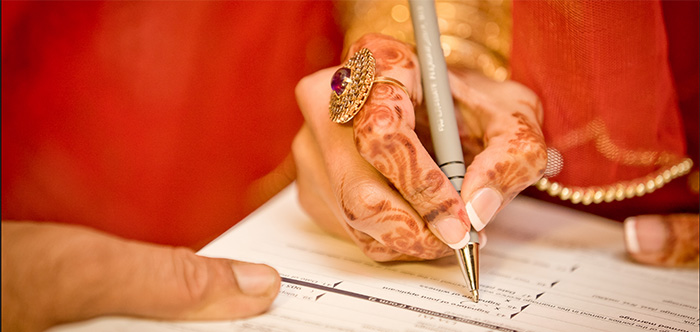
British Courts recognise Sharia Law in landmark divorce case
An Islamic marriage in the UK (a nikah) has up until recently been held as not being a valid marriage recognised by English Law. This means that without a civil marriage alongside a nikah the couple do not have the same rights and protection that other married couple benefit from. The couple are essentially therefore treated as cohabitees meaning, on separation they are unable to make a claim in respect of their spouse’s assets or any on going financial support as a divorcing couple (with the exception of claims in relation to any children).
However in a landmark ruling Sharia Law has been recognised by a British Court for the first time. The High Court ruled that the Islamic faith marriage ‘nikah’ which the estranged couple Nasreen Akhtar and Mohammed Shabaz Khan had undergone was recognised under British Matrimonial Law, which meant that they had the legal status of husband and wife.
The Judge however stressed that the ruling did not apply to all religious ceremonies, which the law must approach ‘on a case-by-case basis’ to see if the facts fall within the Marriage Act 1949.
The case came before the court on the basis that Ms Akhtar applied for a divorce from her husband following a Islamic faith marriage in 1998 but her husband defended it by maintaining that their marriage was in Sharia Law only and not valid under English Law.
The High Court found that the couple had in fact obtained a marriage certificate to satisfy the UAE authorities to enable them to live and work in Dubai and further state authorities in England had treated them as husband and wife.
A Home Office report, commissioned by Prime Minister Theresa May, found that 90% of people who seek help from the Sharia Council are women wanting a divorce. Women are the main users of Sharia Councils as men do not need to apply for an Islamic divorce as they can issue/pronounce a talaq. The report further found that women married under Sharia Law are often unaware that they have no legal protection under British Law.
 The case opens up the debate and has significant implications for women who marry under Sharia Law but not UK Law and could give them the right to divorce their husbands and split the assets, as well as securing a divorce more easily.
The case opens up the debate and has significant implications for women who marry under Sharia Law but not UK Law and could give them the right to divorce their husbands and split the assets, as well as securing a divorce more easily.
If you have queries regarding the matters raised in this article and would like some advice then please contact Muna Saleem, Partner and Head of the Family Team on 0208 567 3477.
